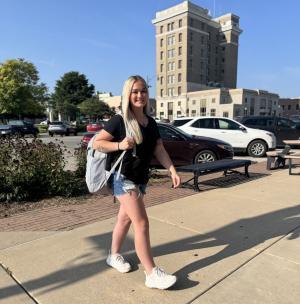Rise and Shine
Real-time tech empowers tomorrow’s teachers
What if students taking the same class in different towns could feel like they’re sharing the same classroom? At LLCC, RISE technology is turning that vision into a reality as the college brings high-tech classrooms to communities.
This semester, future teachers, like John Jones, are building foundational knowledge in his Introduction to Teacher Education class. They are also gaining something more — a front-row seat to how cutting-edge technology is transforming the way students connect, collaborate and learn at the same time across multiple locations.
Jones attends class from LLCC-Taylorville, seamlessly connecting in real-time with students at LLCC-Litchfield, the main campus in Springfield and high schools in Riverton and Tri-City. “The new RISE technology allows us to participate in class in real-time, even though we are 60 or more miles apart,” says Jones.
Creating connections
RISE — Rural Illinois Shared Education network — offers a fully immersive classroom experience powered by high-speed and secure connectivity, multiple interactive touch screens, condenser microphones and cameras that automatically focus on whoever is speaking.
Think of it as looking through a window into another classroom.
“Compared to other conferencing platforms, this is a major upgrade,” Jones says. “It creates a sense of accountability. During the pandemic, I struggled with Zoom classes, but this blends the traditional classroom structure with modern tech — the best of both worlds.”
Dr. Joel Dykstra, associate vice president of academic services, agrees. “It’s about as close as you can get to having the other students in the classroom without physically having them there.”
Education Professor Tim Humphrey, who teaches the course, says the technology allows him to teach naturally and interact with students as if they were all in the same room. “Students in remote areas can see me, engage with the class, respond to questions and participate in discussions,” he explains.
Professor Humphrey calls the technology smooth, user-friendly and says it doesn’t suffer from the lag or glitches common with other platforms.
And each day’s setup? Surprisingly simple. “I can essentially push one button and have it up and running,” he says.
Funding the tech
The RISE technology was made possible through a $550,000 Rural Utilities Service Distance Learning and Telemedicine Grant from the United States Department of Agriculture. The grant’s goal is to connect rural communities with advanced educational tools.
The funding equipped classrooms at LLCC’s Springfield campus and Outreach Centers in Jacksonville, Litchfield and Taylorville, as well as provided portable tech for several rural high schools.
Humphrey’s Introduction to Teacher Education course is the first to use the system, and he is enthusiastic about the possibilities. It bridges geographic distance and makes it easier than ever for students from main campus, Outreach Centers and dual credit programs in high schools (where they are earning both high school and college credit at the same time) to connect and collaborate.
Jones is grateful. “The benefit — and I cannot emphasize this enough — is not having to spend the money on gas to travel. That is money that I can save to use when I transfer to a four-year university.”

Online but not online
Presley Sturtevant, an aspiring teacher, joins the class from LLCC-Jacksonville on Tuesdays and Thursdays. Her class consists of students from the main campus in Springfield, LLCC-Jacksonville and Auburn High School. She says RISE is a refreshing shift from her online courses, which were not in real time. RISE offers real-time engagement and shared classroom experiences across locations.
Sturtevant enjoys having live conversations with students in completely different places. “I feel more connected,” she says. “I like reading facial expressions. It helps me see if someone’s passionate about a topic. You can feel the energy in the room, and it makes you feel like you’re truly part of the class.”
Looking ahead
LLCC hopes to expand the use of this technology in the coming semesters.
“Our deans are exploring rotation models, possibly offering classes from each general education area throughout the day starting in spring 2026, “says Dykstra. “We’re working to maximize classroom use and meet student needs.”
